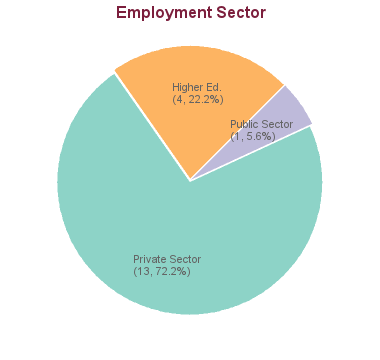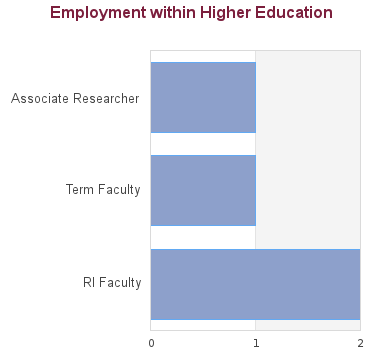Cara James
Doctor of Philosophy in Geophysics (PhD)
Understanding deep-sea mining particulate clouds: predicting environmental impacts, informing regulation and monitoring pollutants

Review details about the recently announced changes to study and work permits that apply to master’s and doctoral degree students. Read more
Theoretically, experimentally, and observationally oriented Master of Science (M.Sc.), Master of Applied Science (M.A.Sc.), and Doctor of Philosophy (Ph.D.) programs are offered in a number of key areas of geophysics. Current interests include topics in observational and theoretical glaciology; climate variability; geodynamics of the crust, mantle, and core of Earth and other planets; geological fluid mechanics; volcanic processes; surface processes on Earth and other planets; origin and structure of planetary magnetic fields; inversion methodologies with application to reflection seismology, mineral exploration, and environmental studies; computational electrodynamics; seismology with observational programs in crustal and upper mantle studies; earthquake studies focused on understanding past and current tectonic processes in Western Canada, and data science including applications of machine learning to Earth scientific problems.
Geophysics at UBC was originally a subprogram within the Department of Physics until 1963 when the Department of Geophysics was formed. In 1972 the Department of Geophysics changed its name to the Department of Geophysics & Astronomy reflecting increased activity in astronomical research and teaching. This department was dissolved in 1996, and geophysics faculty were merged with colleagues from geology, oceanography and, later, atmospheric sciences to become the Department of Earth, Ocean and Atmospheric Sciences (EOAS). EOAS is the largest and most diverse department of its kind in Canada and, accordingly, geophysics graduate students have unparalleled opportunities for engaging in cutting-edge pure and applied research in both traditional geophysical topics and those that cross disciplinary boundaries.
The Faculty of Graduate and Postdoctoral Studies establishes the minimum admission requirements common to all applicants, usually a minimum overall average in the B+ range (76% at UBC). The graduate program that you are applying to may have additional requirements. Please review the specific requirements for applicants with credentials from institutions in:
Each program may set higher academic minimum requirements. Please review the program website carefully to understand the program requirements. Meeting the minimum requirements does not guarantee admission as it is a competitive process.
Applicants from a university outside Canada in which English is not the primary language of instruction must provide results of an English language proficiency examination as part of their application. Tests must have been taken within the last 24 months at the time of submission of your application.
Minimum requirements for the two most common English language proficiency tests to apply to this program are listed below:
Overall score requirement: 100
Reading
22
Writing
22
Speaking
23
Listening
22
Overall score requirement: 7.0
Reading
6.5
Writing
6.5
Speaking
7.0
Listening
6.5
Some programs require additional test scores such as the Graduate Record Examination (GRE) or the Graduate Management Test (GMAT). The requirements for this program are:
The GRE is not required.
All applicants have to submit transcripts from all past post-secondary study. Document submission requirements depend on whether your institution of study is within Canada or outside of Canada.
Many programs require a statement of interest, sometimes called a "statement of intent", "description of research interests" or something similar.
Students in research-based programs usually require a faculty member to function as their thesis supervisor. Please follow the instructions provided by each program whether applicants should contact faculty members.
Permanent Residents of Canada must provide a clear photocopy of both sides of the Permanent Resident card.
All applicants must complete an online application form and pay the application fee to be considered for admission to UBC.
In 2012 the new Earth Sciences Building was completed. The $75 million facility was designed to inspire collaboration and creativity across disciplines.
| Fees | Canadian Citizen / Permanent Resident / Refugee / Diplomat | International |
|---|---|---|
| Application Fee | $118.50 | $168.25 |
| Tuition * | ||
| Installments per year | 3 | 3 |
| Tuition per installment | $1,875.34 | $3,294.66 |
| Tuition per year (plus annual increase, usually 2%-5%) | $5,626.02 | $9,883.98 |
| Int. Tuition Award (ITA) per year (if eligible) | $3,200.00 (-) | |
| Other Fees and Costs | ||
| Student Fees (yearly) | $1,144.10 (approx.) | |
| Costs of living | Estimate your costs of living with our interactive tool in order to start developing a financial plan for your graduate studies. | |
Applicants to UBC have access to a variety of funding options, including merit-based (i.e. based on your academic performance) and need-based (i.e. based on your financial situation) opportunities.
PhD students are guaranteed a minimum salary of CAN$ 25,500 (plus tuition) per year for the first four years, which can consist of research assistantships (RAs) to help professors with their grants and contracts, teaching assistantships (TAs) to help teach courses and labs and grade assignments, scholarships and prizes, and combinations of all the above.
This results in a net balance (any funding provided to the student minus tuition and fees) mean of $46,702 and median of $51,484.
All applicants are encouraged to review the awards listing to identify potential opportunities to fund their graduate education. The database lists merit-based scholarships and awards and allows for filtering by various criteria, such as domestic vs. international or degree level.
Many professors are able to provide Research Assistantships (GRA) from their research grants to support full-time graduate students studying under their supervision. The duties constitute part of the student's graduate degree requirements. A Graduate Research Assistantship is considered a form of fellowship for a period of graduate study and is therefore not covered by a collective agreement. Stipends vary widely, and are dependent on the field of study and the type of research grant from which the assistantship is being funded.
Graduate programs may have Teaching Assistantships available for registered full-time graduate students. Full teaching assistantships involve 12 hours work per week in preparation, lecturing, or laboratory instruction although many graduate programs offer partial TA appointments at less than 12 hours per week. Teaching assistantship rates are set by collective bargaining between the University and the Teaching Assistants' Union.
Academic Assistantships are employment opportunities to perform work that is relevant to the university or to an individual faculty member, but not to support the student’s graduate research and thesis. Wages are considered regular earnings and when paid monthly, include vacation pay.
Canadian and US applicants may qualify for governmental loans to finance their studies. Please review eligibility and types of loans.
All students may be able to access private sector or bank loans.
UBC has working agreements with MPower Financing - an organization providing international students with no-cosigner, no-collateral education loans to study in Canada - and Windmill Microlending - an organization providing loans to skilled immigrants.
Many foreign governments provide support to their citizens in pursuing education abroad. International applicants should check the various governmental resources in their home country, such as the Department of Education, for available scholarships.
The possibility to pursue work to supplement income may depend on the demands the program has on students. It should be carefully weighed if work leads to prolonged program durations or whether work placements can be meaningfully embedded into a program.
International students enrolled as full-time students with a valid study permit can work on campus for unlimited hours and work off-campus for no more than 24 hours a week during academic sessions.
A good starting point to explore student jobs is the UBC Work Learn program or a Co-Op placement.
Students with taxable income in Canada may be able to claim federal or provincial tax credits.
Canadian residents with RRSP accounts may be able to use the Lifelong Learning Plan (LLP) which allows students to withdraw amounts from their registered retirement savings plan (RRSPs) to finance full-time training or education for themselves or their partner.
Please review Filing taxes in Canada on the student services website for more information.
Applicants have access to the cost estimator to develop a financial plan that takes into account various income sources and expenses.
18 students graduated between 2005 and 2013. Of these, career information was obtained for 18 alumni (based on research conducted between Feb-May 2016):


Geophysics graduate programs prepare students for work in a wide range of Earth science disciplines. The programs afford students with strong critical thinking, analytical problem solving, communication, statistical, computational and research skills, and the ability to work effectively in teams.These skills are highly sought after and are transferable to many workplaces. Recent graduates have found employment in academia (universities in Canada, United States, Europe and Australia), government (Geological Survey of Canada), environmental monitoring and mineral exploration industries, hydrocarbon exploration, software engineering (Google) and elsewhere in the technology sector (Tesla).
These statistics show data for the Doctor of Philosophy in Geophysics (PhD). Data are separated for each degree program combination. You may view data for other degree options in the respective program profile.
| 2023 | 2022 | 2021 | 2020 | 2019 | |
|---|---|---|---|---|---|
| Applications | 6 | 7 | 11 | 5 | 6 |
| Offers | 0 | 3 | 2 | 0 | 1 |
| New Enrolment | 0 | 2 | 1 | 0 | 0 |
| Total Enrolment | 11 | 14 | 14 | 16 | 17 |
Students in research-based programs usually require a faculty member to function as their thesis supervisor. Please follow the instructions provided by each program whether applicants should contact faculty members.
These videos contain some general advice from faculty across UBC on finding and reaching out to a supervisor. They are not program specific.
This list shows faculty members with full supervisory privileges who are affiliated with this program. It is not a comprehensive list of all potential supervisors as faculty from other programs or faculty members without full supervisory privileges can request approvals to supervise graduate students in this program.
Current interests include topics in observational and theoretical glaciology; climate variability; geodynamics of the crust, mantle, and core of Earth and other planets; geological fluid mechanics; volcanic processes; origin and structure of planetary magnetic fields; reflection seismology; time-series analysis and wavelet processing; inversion methodologies with application to reflection seismology, mineral exploration, and environmental studies; computational electrodynamics; seismology with observational programs in crustal and upper mantle studies; earthquake studies focused on understanding past and current tectonic processes in Western Canada; and theoretical model studies to investigate wave propagation in laterally heterogeneous media.
Departments/Programs may update graduate degree program details through the Faculty & Staff portal. To update contact details for application inquiries, please use this form.
